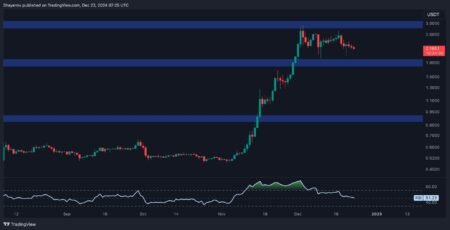President Trump, who is known as the ‘crypto president’, is facing an ethical dilemma regarding whether or not to block U.S. Congress members from trading cryptocurrencies. This decision mirrors the proposed ban on stocks, which he supports. With the crypto market rapidly growing into a multi-trillion-dollar industry, allowing lawmakers to trade in it could raise concerns about potential conflicts of interest. Banning Congress from trading stocks has been a hotly debated topic, with current president Joe Biden also supporting the idea to prevent lawmakers from profiting from markets they have the power to influence.
Although polls show that 75% of Americans agree with banning Congress from trading stocks, the introduction of a ban on trading cryptocurrencies presents an entirely new challenge. Cryptocurrency is decentralized, global, and volatile, with no existing patterns to follow. President Trump’s outspoken support for Bitcoin and other cryptocurrencies has raised questions about his own investments in the industry. Concerns have been raised about potential conflicts of interest that could influence regulatory decisions. A crypto-friendly SEC chief under Trump could benefit the market but raise questions about governance.
The legislative battle over Congress’s trades is ongoing, with the introduction of the ETHICS Act aiming to prevent lawmakers and their families from profiting in markets they influence. Despite growing public demand for change, Congress members are still able to trade stocks freely. The proposed extension of the ETHICS Act to cryptocurrencies is still in the proposal stage. Enforcing such a ban on cryptocurrency trading could be challenging, given the fast-paced nature of the crypto market and its decentralized structure. The public is increasingly concerned about lawmakers profiting while serving the people, and ethical governance in a decentralized market like crypto presents new challenges.
Other countries, such as the UK, Canada, Australia, Germany, and the European Union, have taken steps to ensure transparency in lawmakers’ financial interests, including stocks and cryptocurrencies. Lawmakers in these countries must disclose their crypto holdings to prevent potential scandals. While some countries provide more leeway for lawmakers in owning cryptocurrencies, calls for stricter regulations are growing. The U.S. has been criticized for its vague and loosely enforced rules compared to other countries. While owning cryptocurrencies could help lawmakers better understand the industry to draft smarter regulations, restricting crypto trading could send the wrong message about financial freedom.
Despite the debates and discussions surrounding banning Congress from trading stocks or cryptocurrencies, it is unlikely that President Trump will implement such a ban. Trump’s affinity for making money could influence his decision-making on this matter. The idea of attracting talent to public service also raises concerns that overly strict financial restrictions could deter qualified individuals from entering politics. The ethical considerations of allowing lawmakers to trade in a volatile market like cryptocurrency pose significant challenges to maintaining public trust in government officials. As the U.S. continues to grapple with these ethical dilemmas, the future of crypto trading among Congress members remains uncertain.



















